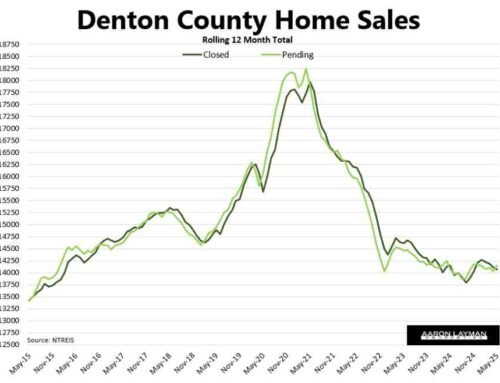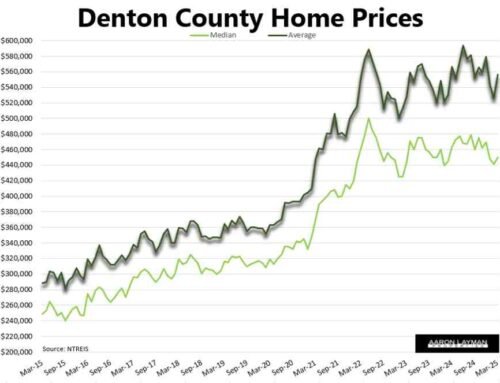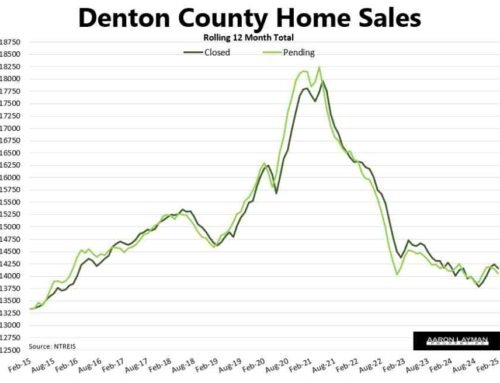Denton County home sales saw a big September decline as Dallas-Fort Worth experienced the sharpest home sales drop in seven years according to the latest NTREIS data. The latest press release on September home sales show a statistically estimated 7 percent drop in total single-family home sales in North Texas during the month of September. Pending sales show to be down 6% year-over-year.
The median price of a North Texas single-family home was $251,000 in September, a gain of 4%. The average price of a single-family home stood at $304,331, an increase of 6%. Single-family rental activity was relatively flat for the month with the average lease price rising 3% to $1759 in September.
The sales declines were even worse for Denton TX and Denton County. Home sales in the City of Denton collapsed more than 20 percent in September (current preliminary trends data shows a 28% decline). Pending home sales in Denton look like they will be down about 5% in September. Average home prices in Denton were up 5% to $265,252. Sales in Denton County declined roughly 14% for the month of September while pending sales are poised to end up down about 16% for the month. Average home prices in Denton County were 6 percent higher than this time last year, posting at $355,369. Double-digit price gains have turned to single digits, and there could be room for more more price compression if inventory keeps rising.
So what happened in September to cause the sudden drop off in sales? In a word…AFFORDABILITY. After exposing the statistically over-estimated sales in North Texas earlier this year, I have been warning anybody who would listen that the red-hot DFW housing market was poised for a correction. From a Layman’s perspective, a big part of the DFW economic growth story can be attributed to central bank intervention, and now that momentum could be turning into a headwind. With the Fed no longer printing, but actually shrinking its balance sheet, we’re about to find out just how resilient the Dallas-Fort Worth economy really is.
Anybody who has been monitoring asset prices and monetary policy could see this correction coming. I have been writing about it for several years. The recent surge in yields and mortgage rates has apparently taken it’s toll on the already diminished affordability of local real estate. As any good Realtor knows, people buy payments, not just prices.
New home sales have been picking up the slack for a soft resale numbers for much of the year, but that trend took a big breather in September, with closings of new construction tanking in Denton County and the greater DFW area as a whole. Publicly traded homebuilders have been punished in the market this year, because Wall Street saw this correction coming as well. Many builders are still trying to push their expensive supply into a market that is demanding more affordable homes. This mismatch between supply and demand will only get worse if mortgage interest rates rise any further. On the bright side, the odds are pretty good that we could see a snap-back decline in yields after the surge experienced during the past few weeks.
To get a glimpse of the detachment from reality that typifies many builders and real estate pundits, recent comments from LGI Homes CEO, Eric Lipar paint the picture perfectly. Here’s what Mr. Lipar had to say regarding weak September and 3rd quarter closings:
“Although closings for the third quarter are down year-over-year, our outlook remains positive and demand for homeownership remains solid…. Assuming that general economic conditions, including interest rates and mortgage availability, in the remainder of 2018 are similar to those in the third quarter of 2018, we believe we are on track to close between 6,400 and 7,000 homes in 2018.”
The problem with Mr. Lipar’s assuming is that mortgage rates are a good 75 basis points higher than they were at this juncture last year. In addition the Fed was just starting to shrink its balance sheet. Now the Fed is rolling off $50 billion per month from that massive balance sheet, injecting long overdue volatility into the markets after years of asset price levitation. In truth there is very little that is similar to this same period a year ago in terms of the economic conditions.
The reversal of the Dallas-Fort Worth housing market may catch many Denton County residents by surprise, just as they are receiving their record high property tax bills in the mail.














Leave A Comment